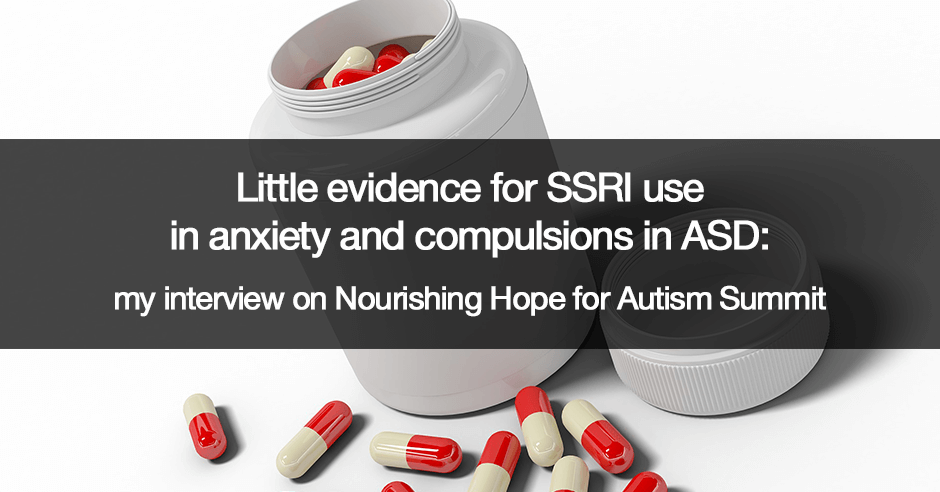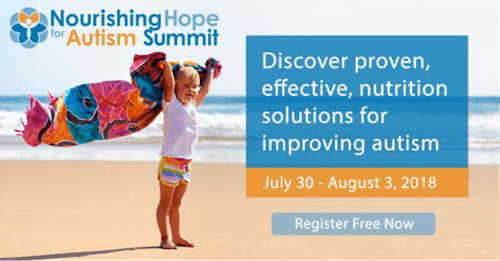
One of the reasons I’m so passionate about participating on summits like The Nourishing Hope for Autism Summit and sharing the powerful nutritional interventions is due to the fact that medications such as antidepressants and benzodiazepines are frequently prescribed in ASD – and the research and clinical evidence shows that children and adolescents with ASD (autism spectrum disorder) are more vulnerable to the side effects.
This paper, Psychopharmacological interventions in autism spectrum disorder, makes the following conclusion:
Psychopharmacological treatment of core and associated symptoms in ASD is challenging, in large part because ASD presents in many different ways. Furthermore, children and adolescents with ASD are more vulnerable to the side effects of psychopharmacological intervention than their age-matched, typically developing counterparts.
This paper, Pharmacotherapy of emotional and behavioral symptoms associated with autism spectrum disorder in children and adolescents, supports this, stating there is little evidence to support the use of SSRIs in ASD:
Selective serotonin reuptake inhibitors are often used in clinical practice to target anxiety and compulsions; however, there is little evidence to support its use in this population. There is a great need for further research on the safety and efficacy of existing psychotropic medications in youth with ASD.
And this paper published a few months ago, An update on pharmacotherapy of autism spectrum disorder in children and adolescents, concludes that
Overall, the evidence is limited for pharmacotherapy in children with ASD, and side-effects with long-term use can be burdensome.
Much of this also applies to adults with ASD and in my interview I talk about the psychiatric medicine concerns within the ASD community and the high incidence of anxiety, aggression, irritability and OCD in this population.
We also discuss the following nutritional solutions in my interview (appropriately titled: How to calm anxiety, and eliminate aggression and OCD) –
- the role low serotonin plays in anxiety, aggression and OCD/obsessions and the use of tryptophan and when to avoid 5-HTP
- the low GABA type of physical anxiety and how to effectively use GABA for results
- how to use inositol for OCD and some wonderful success stories
- lead toxicity and increased anxiety and the protective role of tryptophan and ascorbic acid
- phenols and oxalates other special diets (and my story with oxalate issues)
Our interviews are always fun, science based and practical – and in this one we even shared some of our personal results (both good and bad) with some of these nutrients.

Here are just a few of the speakers and topics I’m really looking forward to hearing:
- James Adams, PhD: The Scientific Evidence Linking Nutrition and Autism Improvement
- Dietrich Klinghardt: Understanding Lyme, Infections, Mold, and Heavy Metals and the Effects on Autism
- Chef Pete Evans: Food is Medicine, Inspiration from a chef
- Kaalya Daniel, PhD: How You Can Use the Healing Properties of Camel’s Milk for Autism
- Dominic D’Agostino, PhD: Is the Ketogenic Diet Right for an Autistic Child?
- Susan Owens, MS: The Inflammasome, Oxalates, Autoimmunity and Autism
- And of course, Julie Matthews, CNC: When GFCF Diets Don’t Work – BioIndividual Nutrition for Autism
This summit provides you with information and tools that address the root causes so medications such as the above do not even have to come into the picture!
The Nourishing Hope for Autism Summit runs July 30 to August 3 and is hosted by my dear friend and colleague Julie Matthews, whose work you’re probably very familiar with. In case Julie’s work is new to you, in my eyes, she is THE autism nutrition expert. I’ve had the pleasure of interviewing her a number of times on the Anxiety Summit, I endorse her Bioindividual Nutrition training (special diets) for practitioners, I highly respect the work she does and I adore her!
The focus of this summit is clearly autism and Julie is THE expert so you’ll learn a ton from the experts she has gathered.
But do keep in mind that those with autism or Asperger’s are often considered the canaries in the coalmine and even if you don’t have a loved one with ASD many of the interviews have wider applications for anxiety, ADHD and other developmental and learning disorders.
Register here for The Nourishing Hope for Autism Summit to learn more! It airs online from July 30 to August 3, 2018
